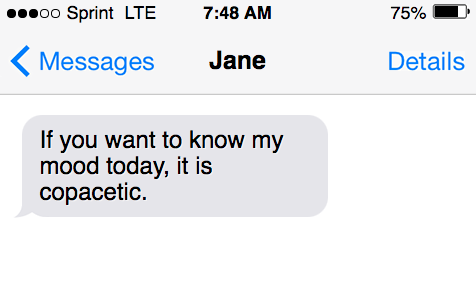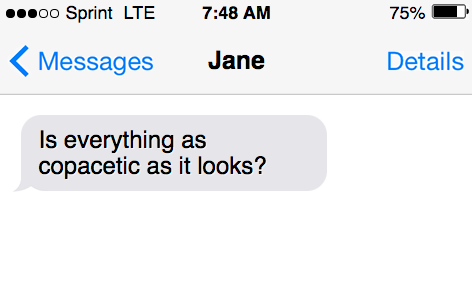What does the word “copacetic” mean? And what does it mean when referring to relationships? Is it considered slang? The word can get thrown around the English language in a fairly common fashion. It can get used as a type of response to a question or a situation.
Learn what the word “copacetic” means in this short guide…
What does “copacetic” mean?
The word “copacetic” is an adjective. It means everything is fine, satisfactory, or going on well. It can get used instead of using the word “ok.” The word indicates to the other person that things are okay or you are fine. It is a typical Americanism, meaning it originated and is used mainly in North America.
Some people in the US and Canada consider this word “slang.” The word is suitable for casual or informal use. It is used in conversations between friends, where this word can get used as an alternative for saying things are excellent. It is used to mean satisfactory or agreeable.
Another use of this word is to describe a relationship that is fine or going on well without problems. It can be also used to describe a situation that is good with no problems.

Synonyms for “copacetic”
Many synonyms can be used for “copacetic.” Try one of the synonyms listed below:
- Satisfactory
- Ok
- Alright
- Cordial
- Fair
- Fine
- Agreeable
- Good
- Hunky-dory
- Satisfactory
- Excellent
- Doing well
- Adequate
- Nice
- Pleasant
- Pleasing
- Gratifying
- Welcome
Antonyms for “copacetic”
The following are antonyms for “copacetic” that can get used as the opposite meaning for the word:
- Not ok
- Disagreeable
- Deplorable
- Dismal
- Unsatisfactory
- Unpleasant
- Poor
- Lousy
- Unacceptable
- Wanting
- Mediocre
| Word | Antonym | Synonym |
| Copacetic | Not okay, dismal, poor | Ok, alright, fair, fine |
The etymology of “copacetic”
The origins of the word copacetic are in US Southern African American slang of the nineteenth century. Although, there is no clear evidence to suggest where this word originated. There are many sources of the word used in American history. While some way it has Yiddish origins, others say it has origins in Louisiana French.
It’s also rumored that the word may have originated from Native Americans. Some people suggest that the well-known entertainer Bill ‘Bojangles’ Robinson was the first person to use this phrase in public. He is even credited with having invented this term for use in his performance.
Some people say that there are origins to the Creole French word ‘coupersetique’. The word means ‘can be coped with’. This is why some people believe it’s the original origin of copacetic.
The only thing for sure is that the word originated in the twentieth century. The first written record of using this word is in 1919. The book ‘A Man for the Ages.” Which was about Abraham Lincoln. Since then, the adoption of the word has increased.
The word was even used in a song during the prohibition era. The song ‘At the new jump steady ball’ included a line that said, “Copasetic was the password for one and all, at the new jump steady ball.” You can note that the spelling was slightly different with an ‘s’ instead of a ‘c.’

Copacetic, copasetic, copesetic, which is correct?
The correct word is copacetic (with a “C”).
An alternative spelling is copasetic (with an “S”).
Technically, copacetic is the correct spelling of the word. The other alternatives are also acceptable to use in informal writing, although not grammatically correct.
Wondering how to pronounce the word? While pronouncing the word, it should get pronounced as koh-puh-she-tik.
Luckily, as long as the pronunciation is correct, variations in spelling aren’t a significant problem (remember, this word is often used in American English as a response for “okay”).
Examples of copacetic used in sentences
- The manager assured the boss that everything in the department was copacetic.
- We are not fully copacetic but are almost reaching there.
- Well, I am happy to let you know that things are copacetic between us now.
- I am sure we are copacetic now, right?
- If you want to know my mood today, it is copacetic.
- Clark was frank enough to admit that things in his life were not really copacetic.
- Is everything as copacetic as it looks?
- I don’t think the situation is very copacetic today.
What is a “copasetic” relationship?
The word “copasetic” means agreeable, okay, and fine.
While this word can get used in different contexts, one of the most common ways to use it is when referring to relationships.
A copasetic relationship is one that’s going well. It is a relationship that is friendly, amiable, and doing okay.
This type of relationship can get described in a sentence like the following: “We’re copacetic now,” or “Things are copacetic between us,” or “We have a copacetic bond.”
Sources
Inside this article
Fact checked:
Content is rigorously reviewed by a team of qualified and experienced fact checkers. Fact checkers review articles for factual accuracy, relevance, and timeliness. Learn more.
Core lessons
Glossary
- Abstract Noun
- Accusative Case
- Anecdote
- Antonym
- Active Sentence
- Adverb
- Adjective
- Allegory
- Alliteration
- Adjective Clause
- Adjective Phrase
- Ampersand
- Anastrophe
- Adverbial Clause
- Appositive Phrase
- Clause
- Compound Adjective
- Complex Sentence
- Compound Words
- Compound Predicate
- Common Noun
- Comparative Adjective
- Comparative and Superlative
- Compound Noun
- Compound Subject
- Compound Sentence
- Copular Verb
- Collective Noun
- Colloquialism
- Conciseness
- Consonance
- Conditional
- Concrete Noun
- Conjunction
- Conjugation
- Conditional Sentence
- Comma Splice
- Correlative Conjunction
- Coordinating Conjunction
- Coordinate Adjective
- Cumulative Adjective
- Dative Case
- Determiner
- Declarative Sentence
- Declarative Statement
- Direct Object Pronoun
- Direct Object
- Diction
- Diphthong
- Dangling Modifier
- Demonstrative Pronoun
- Demonstrative Adjective
- Direct Characterization
- Definite Article
- Doublespeak
- False Dilemma Fallacy
- Future Perfect Progressive
- Future Simple
- Future Perfect Continuous
- Future Perfect
- First Conditional
- Irregular Adjective
- Irregular Verb
- Imperative Sentence
- Indefinite Article
- Intransitive Verb
- Introductory Phrase
- Indefinite Pronoun
- Indirect Characterization
- Interrogative Sentence
- Intensive Pronoun
- Inanimate Object
- Indefinite Tense
- Infinitive Phrase
- Interjection
- Intensifier
- Infinitive
- Indicative Mood
- Participle
- Parallelism
- Prepositional Phrase
- Past Simple Tense
- Past Continuous Tense
- Past Perfect Tense
- Past Progressive Tense
- Present Simple Tense
- Present Perfect Tense
- Personal Pronoun
- Personification
- Persuasive Writing
- Parallel Structure
- Phrasal Verb
- Predicate Adjective
- Predicate Nominative
- Phonetic Language
- Plural Noun
- Punctuation
- Punctuation Marks
- Preposition
- Preposition of Place
- Parts of Speech
- Possessive Adjective
- Possessive Determiner
- Possessive Case
- Possessive Noun
- Proper Adjective
- Proper Noun
- Present Participle
- Prefix
- Predicate



